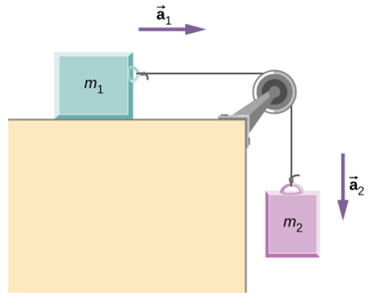cbarker1
Gold Member
MHB
- 345
- 23
Two blocks are connected by a massless rope as shown below. The mass of the block on the table is 5.4 kg and the hanging mass is 2.1 kg. The table and the pulley are frictionless.
 I need to find acceleration, the tension of the rope, and the speed when mass 2 hits the floor when it starts from rest and is initially located 1.3 m from the floor.
I need to find acceleration, the tension of the rope, and the speed when mass 2 hits the floor when it starts from rest and is initially located 1.3 m from the floor.
I need some help with the setup.

I need some help with the setup.
Last edited: